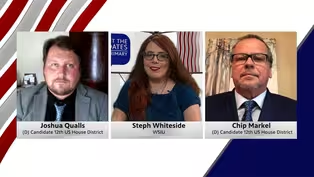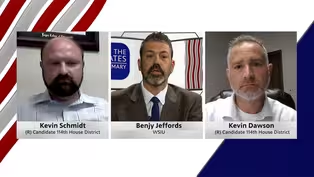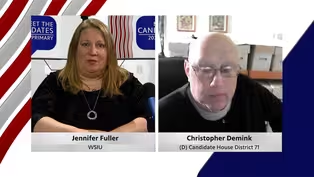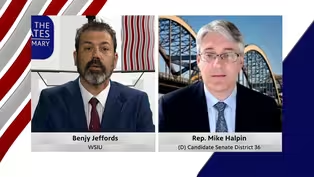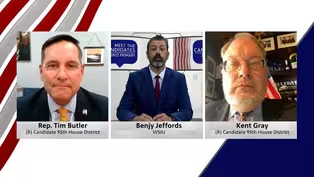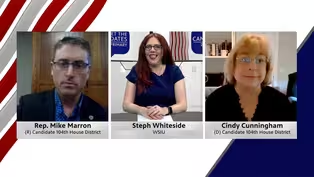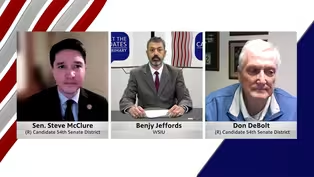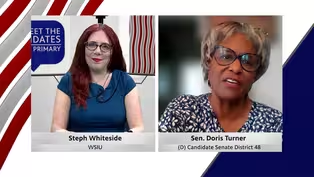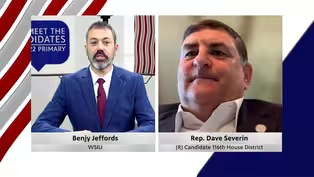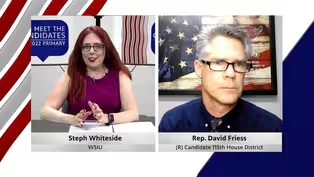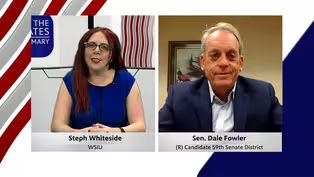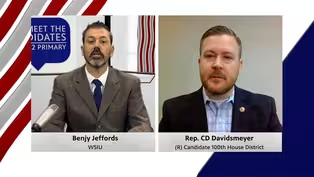Meet the Candidates
117th Illinois House District Primary Rep Candidates
4/14/2022 | 26m 14sVideo has Closed Captions
117th Illinois House District Primary Republican Candidates forum.
Meet the Candidates interviews candidates for the 117th District of the Illinois House, Representative Patrick Windhorst (R) and Ron Ellis (R).
Problems playing video? | Closed Captioning Feedback
Problems playing video? | Closed Captioning Feedback
Meet the Candidates is a local public television program presented by WSIU
This series is produced in partnership with the League of Women Voters
Meet the Candidates
117th Illinois House District Primary Rep Candidates
4/14/2022 | 26m 14sVideo has Closed Captions
Meet the Candidates interviews candidates for the 117th District of the Illinois House, Representative Patrick Windhorst (R) and Ron Ellis (R).
Problems playing video? | Closed Captioning Feedback
How to Watch Meet the Candidates
Meet the Candidates is available to stream on pbs.org and the free PBS App, available on iPhone, Apple TV, Android TV, Android smartphones, Amazon Fire TV, Amazon Fire Tablet, Roku, Samsung Smart TV, and Vizio.
Providing Support for PBS.org
Learn Moreabout PBS online sponsorshipMore from This Collection
Meet the Candidates features interviews with candidates running for Illinois state, House and Senate races. Guests will discuss key issues impacting Illinois voters such as the economy, the environment, education and public health. This series is produced in partnership with the League of Women Voters.
12th U.S. Congressional Seat Primary Candidate Forum
Video has Closed Captions
Joshua Qualls and Chip Markel, running for the 12th U.S. Congressional Seat. (25m 21s)
114th Illinois House District Primary Candidate Forum
Video has Closed Captions
Dr. Kevin Schmidt and Kevin Dawson, running for the 114th House District. (25m 57s)
71st House District Primary Candidate
Video has Closed Captions
Ahead of the June primary, WSIU talked with Christopher Demink, running for the 71st House (21m 35s)
36th Senate District Primary Candidate Forum
Video has Closed Captions
WSIU talked with 36th Senate District candidate Representative Mike Halpin. (26m 29s)
95th Illinois House District Primary Republican Candidates
Video has Closed Captions
Representative Tim Butler and Kent Gray, running for the 95th House District. (26m 58s)
104th Illinois House District Primary Candidates
Video has Closed Captions
104th House District candidates Representative (R) Mike Marron and (D) Cindy Cunningham. (26m 49s)
54th Illinois Senate District Primary Republican Candidates
Video has Closed Captions
54th Illinois Senate District Primary Republican Candidates forum. (25m)
48th Illinois Senate District Primary Democrat Candidates
Video has Closed Captions
48th Illinois Senate District Primary Democrat Candidates forum. (26m 46s)
116th Illinois House District Primary Republican Candidates
Video has Closed Captions
116th Illinois House District Primary Republican Candidates forum. (25m 9s)
115th Illinois House District Primary Republican Candidates
Video has Closed Captions
115th Illinois House District Primary Republican Candidates forum. (23m 14s)
59th Illinois Senate District Primary Republican Candidate
Video has Closed Captions
WSIU interviews Senator Dale Fowler from the 59th Senate District. (27m 29s)
100th Illinois House District Primary Republican Candidates
Video has Closed Captions
WSIU interviews candidate C.D. Davidsmeyer, running for the 100th House seat. (26m 9s)
Providing Support for PBS.org
Learn Moreabout PBS online sponsorship(upbeat music) (dramatic classical music) - This is "Meet the Candidates" with primary candidates for the 117th House District.
I'm Benjy Jeffords, WSIU Public Broadcasting and the League of Women Voters are pleased to host today's forum.
The rules are simple.
Each candidate will have 60 seconds to answer the question and should not mention their opponent in their response.
Joining us today are Representative Patrick Windhorst and Ron Ellis.
Thank you so much for joining us.
Patrick, we'll start with you.
What is your number one priority if elected?
I know it can be hard to narrow it down, but please try to stick to just one.
- Well, thank you, and thank you for having us.
My number one priority is to reverse the population decline we've seen in our state and in particular southernmost Illinois.
When I ran for this job in 2018, it was primarily designed to reverse that out migration we're seeing in Southern Illinois.
I live in Metropolis and I was seeing young families moving right across the river to Peducah, Kentucky because it appeared that Peducah was a better place to live and do business.
So I looked around at the rest of Southern Illinois and saw that those problems existed pretty much everywhere.
So I want to go to Springfield and make change there to improve our business climate, to improve our tax structure so that way Southern Illinois is the good place to live, work, and do business that we know it can be.
- Thank you, Patrick.
And Ron?
- My number one priority is jobs, jobs, and more jobs.
I'm gonna use the same business principles as a CPA that we had, that I used as county commissioner for Williamson County.
Williamson County was the only county to have population growth, commercial growth, residential growth, our sales tax base increased, our schools increased in population, and I'm gonna bring those same business principles to the entire region of the 117th.
I've been meeting with mayors, county boards, and I've got a list of things that we can do to bring jobs to the region.
And when you bring jobs into the region, as in Williamson County, that raises all, that tide raises all boats.
And we can do the same thing.
I'm gonna hire a grant writer and we're going to do something that's never been done before in this region and that is to bring jobs in.
I'm gonna start specifically with the Dixon Springs Work Camp and get that started.
- Thank you, Ron, your time is up.
We'll start with you again this time, Ron.
What would make you an effective lawmaker if elected?
- Well, my experience that I've had as county commissioner and county chairman for Williamson County.
I know how to work with people.
I know how to work with people in the Democratic Party, the Republican Party and to get things done.
And we set up TIF Districts, we set up enterprise zones and there's a lot of things being in Illinois is a severe disadvantage when it comes to the workforce, obviously.
People are leaving the state.
But Williamson County is different.
We see growth in Williamson County and huge amounts of growth.
We grew $567 million in the time that I was county commissioner.
And that's not by accident, by working together.
And we'll bring those same business principles to the entire region.
- Thank you, Ron.
Patrick?
- Well, what I'll do is I'll continue my work that I've begun over the last two terms since I've been in office and that is to be a strong advocate for Southern Illinois values in Springfield.
I'll be a strong advocate with the Democrats on the other side of the aisle, that way I can advocate for the things we need here in Southern Illinois and also make sure that what we believe in is being heard by everyone in Springfield.
Also be a strong advocate with state government to make sure the agencies and and department heads are hearing our needs and are addressing our needs.
And I'll be a strong advocate within the Republican caucus to make sure that we have a strong voice there for what we believe in.
I've been able to do that for the first two terms that I've had and I'll be continuing to do that next term if I'm reelected.
It's important to have a strong advocate in Springfield because a lot of the issues that we're facing, they start with the problems that we see in Springfield.
So we need a voice there to advocate for those issues, the changes that we need.
And by making those changes and we can see the growth that we want and to Southern Illinois.
- Thank you, Patrick.
And the next question is for you also, Patrick.
The pandemic really exposed disparities in education funding.
What would you do to make sure schools in your district are able to meet the needs of families and students?
- Well, a lot of the education funding that we see is primarily property tax base, which puts us, in Southern Illinois, at a disadvantage to the rest of the state.
But it also puts us at a disadvantage to surrounding states, which causes a lot of people to want to leave Illinois because of our high property tax rates.
So what I have been a strong advocate for is the state picking up its share of the burden in funding education.
And we've seen that over the last several years with the evidence-based funding model that has been put in place and has continued to be funded.
That needs to be strengthened and we need to make sure that we have equal opportunities throughout our public schools in the state of Illinois.
And if we have those equal opportunities, we will see our students thrive just as we see in suburban Chicago where they have a higher property tax base and, therefore, more funding for their schools.
If we use the state and the state meets its constitutional obligation to fund schools, then we will be in a better shape in Southern Illinois.
And it's also important-- - Thank you, Patrick.
Your time's up.
Ron, same question to you.
- The disparity that we have in the State of Illinois is absolutely atrocious.
The real estate values of the properties in the seven (indistinct) area around Chicago is grossly much higher.
And when 67% of the real estate tax bill on a local level is made up for the school district, we're gonna be in serious trouble.
So what we need to do is we need to take the gambling money, the lottery money.
When lottery was started in the state of Illinois, that money was supposed to go to schools.
Well, it's not done it.
And that was supposed to be the fix all for all the schools in the state of Illinois.
We need to take that money and put it back.
- Thank you, Ron.
And we'll start with you this time, Ron.
The state budget is a major priority in Springfield.
Name three things you would prioritize.
- Well, the first thing that needs to happen is, the prioritize would be for the actual spending that we need to have.
We need to get rid of all the fluff in the budget.
And the budget is loaded with pork programs.
We need to eliminate all elected officials participating in the pension.
Until they get the pension, because that is our biggest crisis that we have going forward at this moment.
That needs to stop.
And healthcare should be seriously looked at across the state and quit funding the schools.
The budget should not be funding the schools in Chicago, which it presently is.
Downstate dollars should not, for any reason, be going to supplement the Chicago school systems.
- All right, thank you, Ron.
And Patrick?
- Yeah, so my three priorities are education, pensions, and public safety.
First with education.
Education should be the number one funding priority of state government.
The constitution says that it is supposed to be the primary funder of education, the state government is, and we need to make sure that obligation's being met.
Funding education is how we're gonna build a brighter future for our state and for our students, and hopefully for young families to come to Illinois.
Pensions has create the inability or the failure, I should say, to fund pensions, has created a large debt, over $100 billion in pension debt that has to be addressed.
What's caused that has been the failure of state leaders to put the right amount of money into the pension payment, even taking pension holidays where the payment was not made at all.
We need to make sure that we are making the appropriate pension payment.
And we also need to make sure we're funding public safety.
The Illinois State Police, Illinois Department of Corrections, and funding to our local sheriffs and police departments needs to occur.
We need to be making sure we're defending and supporting police, not defunding them.
- Thank you, Patrick.
And now that we've talked about the budget priorities, what things would you like to cut?
- Well, there are a few things that we need to look at in the budget.
First, you have to make sure your priorities are covered, that's the first starting point.
But then there are several items in the budget that we need to make sure that we take our trim.
We need to make sure we're not having duplicative programs, that we're spending on two programs that do the same thing, and taking a hard look at that budget.
There are also some things that actually were just put in this most recent budget that should be cut.
We increased Medicaid payments to undocumented immigrants, legal immigrants, going down to the age of 42.
That's inappropriate.
We should cut that program out.
We should also end the tax payer funding of abortion.
That should be eliminated.
And then we should end pay raises for legislators.
That was in the budget this time, it was one of the reasons I voted against the budget was those pay raises and those should be eliminated.
Those are a few areas we can save money for the state.
- Thank you, Patrick.
And Ron?
- The pork projects, those are just ridiculous to put billions of dollars in there.
We need to fund our schools.
We need to fund our pensions.
Once we get that fixed, we're in a lot better shape.
We also need to, as I said earlier, cut the pensions out for legislatures and the pay raises.
And another thing is making Illinois a sanctuary state is absolutely ridiculous.
Being a sanctuary state in seven to 10 days, if you're and illegal alien coming into our state, you can have your green card, you can have housing, you can have food stamps, and you can be on Medicare at the age of 55, and you haven't even paid anything into it.
That's got to stop.
- Thank you.
For the next question, Ron, we'll move on to some more recent events.
Although the economy is recovering from the early stages of the pandemic, inflation is also on the rise.
What would you do to help Illinoisans who are finding their paychecks don't stretch as far as they did even a couple of months ago?
- Well, we need to work with the federal government, our elected officials there and get it to where oil can be our number one product.
In Illinois, coal, we have an abundance of coal here.
We should be able to utilize that.
Lake of Egypt has a power plant.
It's in the scope of being closed in a few years, which is absolutely ridiculous when we're going to be importing our electric from Tennessee, the TVA, which burns coal for its electricity.
We need to set up fracking and eliminating the nuclear power plants that we have in Northern Illinois that produces electricity for 1.2 million people.
We do not have the green technology or the wind technology to offset that kind of loss.
- Thank you, Ron.
And Patrick?
- Well, when it comes to dealing with inflation, it's a big hit for us in Illinois because we're one of the highest tax states in the country.
So our tax payers face that worse than surrounding states.
So several ways we've looked to address that.
One is the pinch we see when we go to the grocery store and the amounts that are paid and taxes there, that's one way to address it.
Another way is the tax we see on gasoline.
The recent budget put in some relief through a tax incentive plan.
That was unfortunately temporary tax relief, not permanent tax relief like we need to see.
One thing we have advocated for on the Republican side has been for either the elimination or the curtailing of the additional sales tax on gasoline on top of the motor fuel tax.
If we were to take that tax down, that would bring us closer to surrounding states who have much cheaper gasoline prices and would save our citizens here in Southern Illinois from paying so much at the pump.
- Thank you, Patrick.
And many people are pushing for renewable energy, especially with the rising price of oil.
At the same time, parts of Illinois have fossil fuel supplies that could provide energy for many years to come.
What would you do to Illinois has a steady supply of energy and keep it affordable for Illinoisans?
- Well, I would advocate for an all-the-above approach.
We need to use renewables where we can, but that is not gonna provide enough energy or power that we need.
In fact, Illinois has been an exporter of energy.
We will become an importer of energy if we do not reform some of the policies we've seen recently in Springfield and Washington.
Particularly in Springfield, we need to repeal Illinois' version of the Green New Deal.
That's gonna cause some of our coal fire power plants to close and it's gonna have a bad impact on energy going forward in our state.
I'm strongly supportive of coal.
We need to invest in technologies to make sure that we can continue to use coal and have that as a source of the energy in our state.
- Thank you, Patrick.
And Ron, same question to you.
- Yeah, energy in this state is critical.
It's our life bread.
It's what keeps everything going for Pete's sakes.
And we have an abundance of coal here.
We need to be able to mine our coal.
We need to be able to mine our gas and our oil.
We have unbelievable supplies right here in Illinois.
And by not allowing our state to utilize those is just an absolute travesty.
It causes, as we have seen, it causes all of our costs to go up dramatically.
And the gas prices that we have to pay is absolutely exorbitant.
And we have got to be able to mine our gas and oil and get it to the market.
- Thank you, Ron.
and again, the next question's for you.
COVID-19 really changed the way people look at healthcare and public health.
What would you do to make sure Illinois is prepared to handle future public health emergencies?
- Well, the first thing we should never have a dictator, one person dictating how the entire state is, if we have to wear a mask, we have to have shots.
No, that is an absolute travesty.
And there is no reason one person and one person only should be able to decide what is best for us.
This is a local issue, it's a family issue.
If my family or your family chooses to have a vaccination or chooses to wear a mask, that's our family's obligation, that's our right.
And for us to have our rights taken away from us is an absolute abomination.
And I will make sure that that can't happen.
- Thank you, Ron.
And Patrick?
- Yes, I've been a strong advocate for local control.
Local control in our schools, as it relates to education, how the schools respond to the pandemic, local control for our cities and counties on how they handle the pandemic and local control also for local public health departments.
The state has a role and that's providing the best information it can to those local entities so they can make the decision here on the ground locally.
We need to move away from governance by just one person.
What we've seen with that policy is a disaster and a one-size-fits-all approach and I don't believe it served the state well.
One thing I have advocated for is a change to the emergency management act of the state.
So that way the governor can only have one emergency declaration for 30 days before he has to go to the legislature to get approval for additional declarations.
Right now, the governor is making unlimited and repeated emergency declarations, which has allowed him to make these executive orders without any oversight or checks and balances.
- Thank you, Patrick.
And the next question is for you.
Gun violence continues to be a problem for communities across the state.
What would you do to address the violence and how do you balance that with the Second Amendment rights?
- Well, as it relates to gun violence, we have laws on the books now against murder, aggravated discharge of a firearm, illegal possession of firearm.
Those laws need to be enforced, particularly in the areas where the violent crime is occurring and that's in Cook County and Chicago.
The prosecutor there needs to make sure that she is enforcing the laws and using the laws we have to deal with it.
I'm a strong supporter of the Second Amendment and I believe that the Second Amendment is something that should be respected and I don't believe that is occurring right now in Springfield.
What I would advocate for is a repeal of the FOID Card Act, which I believe is unconstitutional.
We will see the courts, I believe, rule on that here soon.
We need to move away from that process and just focus on enforcing the laws against those who are breaking the law in a violent fashion.
- Thank you, Patrick.
And Ron, same question to you.
- The FOID card is unconstitutional.
That is the FOID card is used as a revenue source for the State of Illinois.
Gun violence in the State of Illinois, we have enough laws in this state right now that if they were enforced, Chicago would be gun-free.
It's not gun-free.
And what's being done right now is to make law-abiding citizens who own a gun legally to be the bad person.
That's wrong.
We need to have it set up, my right to carry a gun, I'm a member of the NRA, my wife and I shoot.
We enjoy it.
When I was in high school, everybody had a gun rack in the back of their pickup truck.
We didn't have any problems with people going into schools at that point in time, shooting people.
And it is a local issue.
Guns don't shoot people, people do.
- Thank you, Ron.
Next question is for you.
Criminal justice reform is a hot topic in Springfield.
Do you support changes to the system including alternative sentencing options like drug courts?
What changes would you make to ensure safety, while also making sure rehabilitation remains an option?
- Drug court is a tremendous benefit for people that are trying to get their life straightened up.
In Williamson County, we have a 88% success rate in our drug court for people coming through drugs, alcohol rehabilitation, and getting the support and the help that they need.
88% success rate is absolutely tremendous.
We can take the same principles that we use right here in Williamson County and take it across the land.
But the gun problem should not be applied to all people across the state.
In the rural areas of Illinois, for Pete's sakes, we do a great job with patrolling ourselves.
In Chicago, the rules that they're putting in place right now protect the illegal drug runners.
- Thank you, Ron, your time's up.
Patrick, same question to you.
- Well, I'm former state's attorney in Massac County and spent many years working in court and dealing with issues of drug addiction.
So when we're dealing with someone who's drug addicted who has not committed a violent crime, I'm strongly in favor of using specialty courts, such as drug courts to deal with those individuals.
And I've seen success occur with getting people treatment and getting their lives turned around.
When we're dealing with violent crime, we have to treat violent crime seriously.
And unfortunately right now, there is a big push in Springfield to strip out a lot of the laws in our criminal justice system that deal with violent crime.
We had a violent crime spike in the mid nineties.
That was dealt with through criminal justice legislation that resulted in a rapidly declining crime rate until about the mid 2010s.
What we saw after that point, about mid 2010s, was this beginning this effort of what's called criminal justice reform.
I was a big person to speak out against the Safety Act, which is gonna eliminate cash bail.
And for my efforts, I was named the Illinois Police Chiefs Association public official of the year.
I will stand strong against violent crime and protecting our law enforcement officers.
- Thanks, Patrick.
The next question is for you.
Recent events have shown how much Americans can be impacted by global politics as evidenced by supply chain shortages and rising prices due to the pandemic and fighting in Ukraine.
What would you do to try to help minimize the disruption of events like these on the people of Illinois?
- Well, I think it's important to work with our federal partners, Congressman Bost, Congresswoman Miller, and other individuals who are in Congress in Southern Illinois.
Also, we need to work with across the aisle with our US senators, make sure we're being advocating for the things we need here in Southern Illinois.
One of the things that my office has done in addition to serving as constituent services and helping our constituents with state issues, we also help them with federal issues that need to be addressed by our elected federal representatives.
And that includes some projects that can only be handled federally, such as levies on the river, as well as individual issues that need to be handled by the federal government.
What we'll see is when we're all working together.
When you have local officials handling local issues.
When you have the state officials dealing with state issues and the federal officers and elected officials dealing with their issues, all working together for the best interest of the citizenry, we will have the government working as it should and not opposed to one another.
- Thank you, Patrick.
And Ron, same question to you.
- The global economy is critical to the State of Illinois because as of our grain exports, wheat, corn, soybeans.
These are things, these are commodities that we export all around the world.
And when you have supply chain interruptions like what's going on with the aggression of Russia right now, it puts Illinois at a severe detriment.
And we need to, as an elected official, I would love the opportunity to work with our federal elected officials to try to expand those grain markets that we have.
We have river, we have rail.
With the port that's being planned in Cairo, we have an avenue to get our grain product all around the world quickly.
- Thank you both so much for joining us for "Meet the Candidates" for House District 117.
With candidate Representative Patrick Windhorst and Ron Ellis.
Tune in next Thursday at seven PM as we speak with the candidates from Senate Districts 58 and 59.
For WSIU, I'm Benjy Jeffords.
(dramatic music)

- News and Public Affairs

Top journalists deliver compelling original analysis of the hour's headlines.

- News and Public Affairs

FRONTLINE is investigative journalism that questions, explains and changes our world.












Support for PBS provided by:
Meet the Candidates is a local public television program presented by WSIU
This series is produced in partnership with the League of Women Voters

